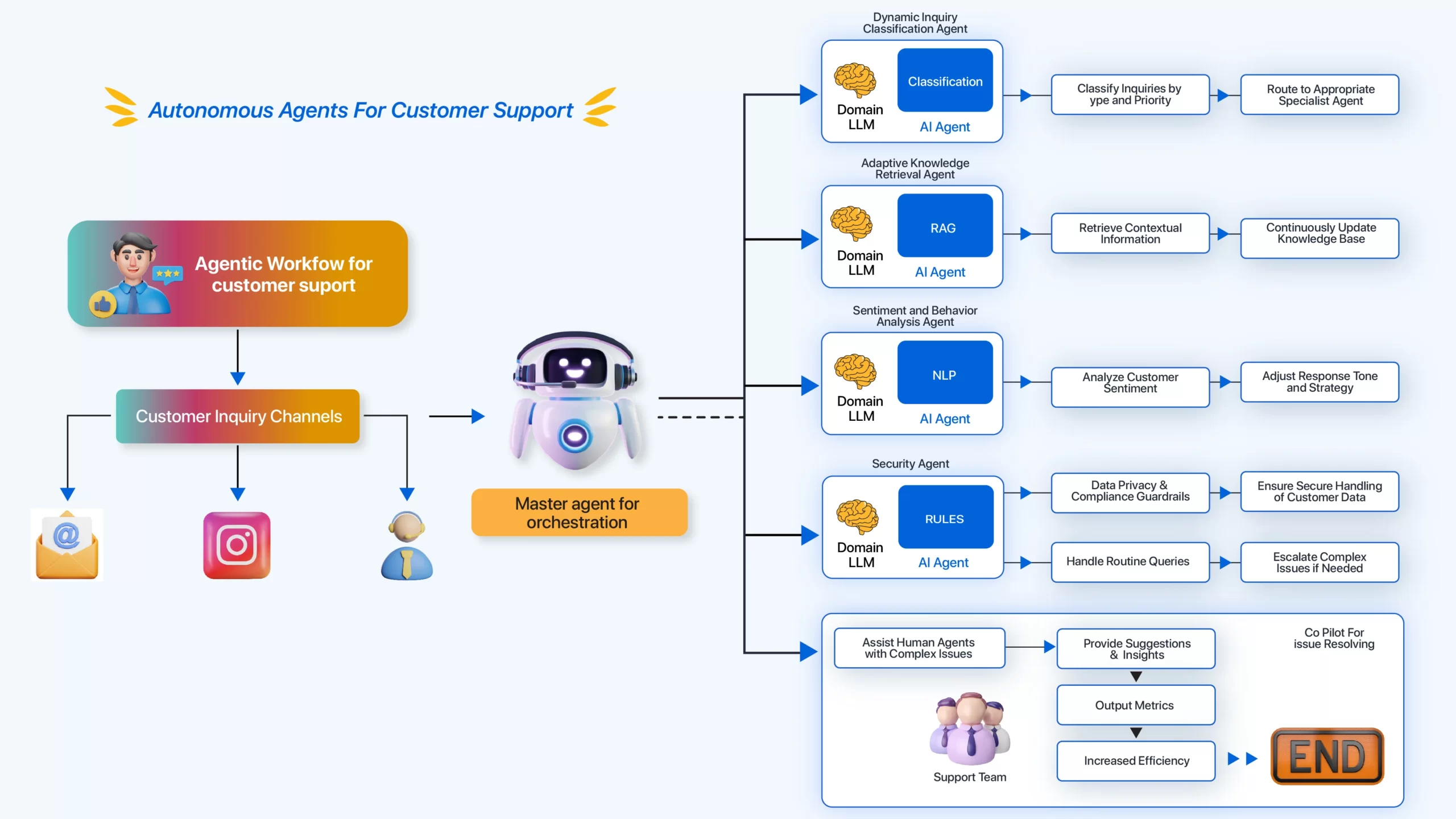The Role of AI Agents in Online Business
Veejay Ssudhan
June 25, 2025In today’s fast-paced digital landscape, online businesses are under constant pressure to evolve and provide better customer experiences, streamline their operations, and stay ahead of the competition. Artificial Intelligence (AI) agents have emerged as powerful tools that help businesses achieve these goals. But what exactly are AI agents, and how do they impact online businesses? Let’s explore their role, benefits, and practical applications.
What Are AI Agents?
An AI agent is a software program that uses artificial intelligence to make decisions and perform tasks. These agents can understand, learn, and interact with humans or other systems to accomplish specific objectives. In the context of online business, AI agents might appear as chatbots, recommendation engines, virtual assistants, or automated marketing tools.
Transforming Customer Service
24/7 Availability
One of the most visible uses of AI agents is in customer service. Chatbots and virtual assistants can handle customer inquiries around the clock, providing immediate responses to common questions. This non-stop availability increases customer satisfaction and frees up human agents for more complex tasks.
Personalized Interactions
AI agents can analyze customer data to offer personalized recommendations and solutions. For example, an online store’s chatbot might suggest products based on a customer’s browsing history or previous purchases. This level of personalization not only improves the shopping experience but can also boost sales.
Driving Sales and Marketing
Targeted Marketing Campaigns
AI agents excel at analyzing vast amounts of data to identify trends and customer preferences. Businesses use this information to create targeted marketing campaigns, ensuring that the right message reaches the right audience at the right time.
For instance, AI-powered email marketing tools can segment customers based on their behavior and send personalized messages that are more likely to convert. These tools can also optimize send times and subject lines to improve open and click-through rates.
Dynamic Pricing
Online retailers often use AI agents to implement dynamic pricing strategies. By monitoring demand, competitor pricing, and other factors in real time, AI agents can adjust prices automatically to maximize revenue or remain competitive.
Enhancing Operational Efficiency
Automating Routine Tasks
AI agents can automate repetitive tasks such as processing orders, managing inventory, or updating product descriptions. This reduces human error and allows staff to focus on higher-value activities.
For example, if an item is running low in stock, an AI agent can automatically reorder it or alert the relevant team members. This ensures smoother operations and prevents stockouts or overstocking.
Fraud Detection and Security
E-commerce platforms are frequent targets for fraud. AI agents help monitor transactions for suspicious activity by analyzing patterns that may indicate fraud. If something unusual is detected—like a sudden spike in orders from a single account—the system can flag it for review or take immediate action.
Improving Customer Insights
Data Analysis
AI agents are adept at processing and analyzing large datasets—something that would be nearly impossible for humans to do manually. By examining purchasing patterns, browsing behavior, and feedback, businesses gain valuable insights into what their customers want.
These insights help businesses make data-driven decisions about product offerings, marketing strategies, and even website design.
Predictive Analytics
AI agents can predict future trends based on historical data. For example, they can forecast which products will be popular during certain seasons or help anticipate customer churn. Businesses can then proactively address potential issues or capitalize on upcoming opportunities.
Supporting Scalability
As an online business grows, so does its operational complexity. AI agents make it easier to scale by handling increased workloads without the need for proportional increases in staff. Whether it’s managing more customer inquiries or processing higher volumes of orders, AI can help businesses expand smoothly.
Real-World Applications
Let’s look at a few practical ways AI agents are being used in online business:
- Chatbots: Deployed on websites and social media platforms to answer questions, process orders, and schedule appointments.
- Recommendation Engines: Used by companies like Amazon and Netflix to suggest products or content based on user preferences.
- Virtual Shopping Assistants: Help customers find products that match their needs through guided conversations. Omnichannel Shopping has become the go to marketing strategy for many retailers.
- Automated Email Responders: Reply instantly to common requests or route more complex queries to human staff.
- Inventory Management Systems: Analyze sales data and predict future inventory needs.
Overcoming Challenges
While the benefits are significant, integrating AI agents into online business comes with challenges:
- Data Privacy: Businesses must ensure that customer data is handled responsibly and complies with privacy regulations.
- Customer Trust: Some customers may be wary of interacting with AI instead of humans.
- Implementation Costs: Developing or adopting AI solutions requires investment in technology and training.
Businesses should approach these challenges thoughtfully by being transparent with customers about how AI is used, investing in robust security measures, and gradually integrating AI solutions alongside human staff.
The Future of AI Agents in Online Business
The role of AI agents will only continue to grow as technology advances. We’re likely to see even smarter virtual assistants capable of handling more complex interactions, deeper personalization powered by real-time data analysis, and seamless integration across multiple platforms.
As voice assistants and natural language processing improve, AI agents will become even more conversational and human-like. This evolution will blur the lines between traditional customer service representatives and digital assistants.
Final Thoughts
AI agents are transforming online business by improving customer service, driving sales, boosting operational efficiency, providing valuable insights, and supporting scalability. While challenges exist, the benefits far outweigh them for most businesses.
Adopting AI agent isn’t just about keeping up with competitors—it’s about creating better experiences for customers and building a foundation for sustainable growth in an increasingly digital world. As technology continues to advance, those who embrace AI will find themselves at the forefront of innovation in online business.
All Tags
